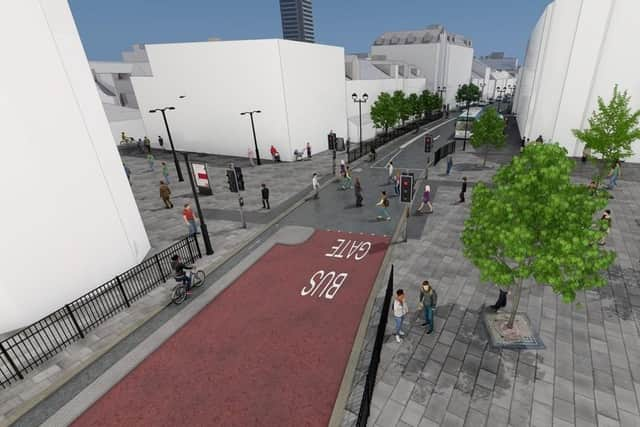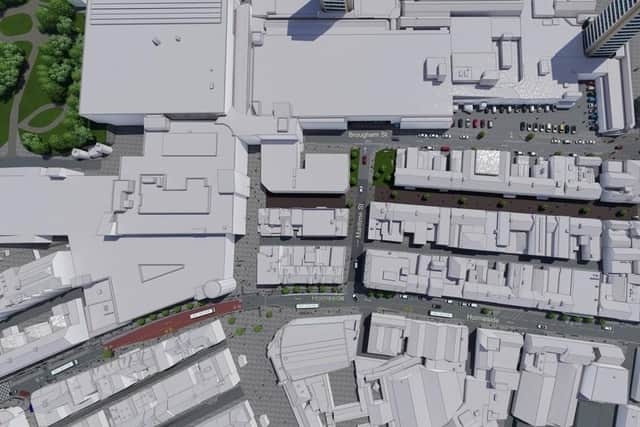Row brewing over new 'bus gate' which will see breaching drivers fined in Sunderland city centre
and live on Freeview channel 276
Sunderland City Council bosses have been progressing plans for a new traffic arrangement in the Holmeside area to support wider regeneration efforts.
This includes a redeveloped central rail station and multi-storey car park, along with major changes to the way traffic can navigate surrounding streets.
Advertisement
Hide AdAdvertisement
Hide AdPlans for a road link connecting Holmeside to Brougham Street by cutting through Maritime Street, across Blandford Street and through the demolished Peacocks store site, have previously been approved by councillors.


At a recent meeting of Sunderland City Council’s Planning and Highways Committee, councillors were asked to consider the next stage to make the gyratory plans a reality – a traffic regulation order (TRO).
Plans aimed to legalise a new system directing traffic in a clockwise direction along Holmeside, up to Brougham Street and around to Waterloo Place before returning traffic to Holmeside.
According to planning documents, the scheme is intended to reduce congestion, improve journey time reliability for buses and taxis, “enhance the pedestrian environment” and improve road safety.
Advertisement
Hide AdAdvertisement
Hide AdA camera-enforced “bus gate” will also be brought in at a new narrowed Crowtree Road junction to prohibit vehicles using Holmeside as a “through route”.


The bus gate would be marked “buses, taxis and cycles only” and although bus services would still be able to travel onto Vine Place, this would be “westbound only”.
During consultation on the TRO, the proposals were backed by transport operators including Stagecoach, Go North East and Station Taxis.
However a total of 12 objections were received with a report prepared for councillors identifying objectors as city centre businesses, although many had their names omitted.
Advertisement
Hide AdAdvertisement
Hide AdConcerns included the removal of the eastbound traffic movement, reduction in passing trade, traffic exiting the city westbound, road safety and access to loading bays.
Other concerns included the impact of the bus gate and risk of fines, “lack of visibility” for potential customers, future issues with deliveries and pedestrian safety concerns.
One objection came from independent menswear store Aphrodite, claiming the bus gate plans would leave businesses on Vine Place “very isolated”, having a “very damaging effect on footfall and business in this part of the city”.
Members of the Planning and Highways Committee were asked to consider the objections at a meeting at City Hall on Thursday, September 22.
Advertisement
Hide AdAdvertisement
Hide AdA recommendation was put forward by council officers for the objections “not to be upheld”, which would allow the TRO to be approved.
A number of objectors spoke at the meeting, including representatives from Tullys Sewing Machines and Harrison & Brown Furniture, stating the plans would have an impact on their businesses.
Concerns also included the proposed bus gate “scaring customers from coming into the city centre” and the bus gate being used as a “money-making scheme” for the city.
However, a council report confirmed that income generated from fixed penalties issued as a result of the bus gate would be “ring fenced” and “spent on future road safety/highway intervention schemes”.
Following discussion councillors on the committee were divided on the proposals, with some seeking clarity on the practical impacts on local businesses.
Councillor James Doyle, who previously questioned the rationale behind the wider Holmeside bus priority and gyratory scheme, repeated concerns about the proposals.
Cllr Paul Edgeworth, Liberal Democrat for Sandhill ward, added: “Bus passengers from places like Grindon and Thorney Close will be up in arms when buses are no longer able to travel down Vine Place and Holmeside and people can’t get off the bus at TK Maxx for easy access to The Bridges.”
Advertisement
Hide AdAdvertisement
Hide AdAfter being put to the vote, the TRO was narrowly approved with five councillors voting in favour and four against.